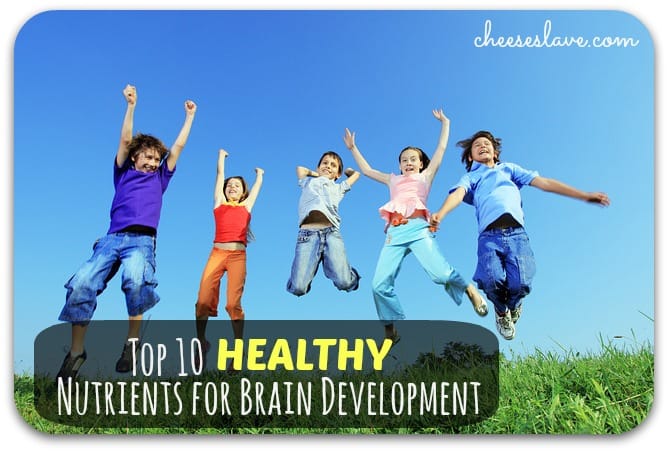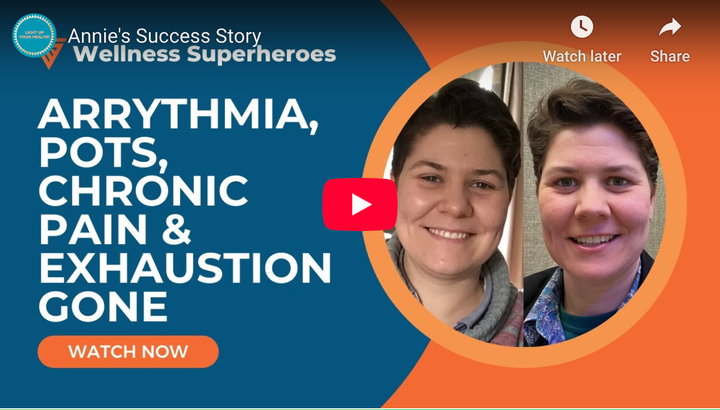Top 10 Healthy Nutrients for Brain Development
Developing brains, whether those that are still in the womb or those of our growing children, need the right nutrients in order to thrive.
Developing brains, whether those that are still in the womb or those of our growing children, need the right nutrients in order to thrive.
In a culture where the consumption of processed foods makes that more of a difficulty than it should be, it’s crucial to know what real foods we should feed our children in order to obtain the best nutritional value.
Here are the top 10 healthy nutrients for brain development.

Top 10 Healthy Nutrients for Brain Development
1. Vitamin A
Nutritionists have known for some time that Vitamin A is important for the developing brain during pregnancy, so it is important to include Vitamin-A rich real foods in your diet if you are seeking to become pregnant. The key role Vitamin-A plays is implementing cell differentiation in the formation of the heart, kidneys, lungs, skin and other essential organs.during the first stages of fetal development.
You should have optimal levels of Vitamin A before you get pregnant because by the time you know you are pregnant, the organs have already formed. Deficiency can cause miscarriage, as well as malformation and inadequate functioning in any of these key organs. (Source).
The brain does not stop developing after birth and continues to form throughout a child’s adolescence. New research is also showing that the genesis of new neurons in the hippocampus occurs during adulthood, which means that Vitamin A from natural sources can be a good thing to continue for brain maintenance after the brain is fully formed.
Studies have shown that deficiency in Vitamin A can be strongly negatively correlated with task completion. Appropriate levels of Vitamin-A may be involved in the production and regulation of dopamine, which is related to the ability to successfully perform and complete tasks. (Source).
There is some controversy regarding the toxicity of Vitamin-A. Some studies have shown that too much Vitamin-A can have some deleterious effects. Sally Fallon Morrell writes:
“Looking at all the studies on vitamin A, we discovered that the vitamin is only toxic if it is taken without the co-factors. And the two main co-factors for vitamin A are vitamin D and vitamin K2. These vitamins typically come in the same foods as vitamin A, so if you’re getting your vitamin A from foods, no problem. But if you are taking vitamin A as a supplement, or eating foods “enriched” with vitamin A, such as cereal or milk, then yes, vitamin A can be a problem. In Europe, vitamin A is added to a lot of foods, and researchers there found a connection of vitamin A with osteoporosis, especially in Scandinavian countries. What vitamin A does in these situations is create a vitamin D deficiency, hence the problem with bone loss.”
You can get Vitamin A, along with Vitamin D, from pastured egg yolks (not whites) and cod liver oil.
2. Zinc
One of the benefits for the developing brain is zinc because of its capacity to enhance and support memory and cognitive stability. Zinc strengthens communication between neurons and the hippocampus, and may also play a role in resisting some of the mental effects of aging (such as memory loss, dementia and other common symptoms). (Source).
Due to the way foods are farmed and processed, you may not be getting all the zinc you need in the foods where it is commonly found, such as beef, liver, cheese or beans. Because of this, it is important to get your food from local, organic sources, and to consume real food rather than the processed food that you will find at your commercial grocer.
Oysters are one of the very best sources of zinc. Oysters contain over 4 times more than the next best source, wheat germ, and over almost 7 times more zinc than the next best sources, beef or beef liver.
3. Vitamin D
A common deficiency in the diet of Americans, Vitamin D is crucial for the absorption of minerals as well as for its metabolic function. According to a study conducted by the National Health and Nutrition Examination Survey, 42% of Americans are vitamin D deficient. Insufficient levels of vitamin D have been linked to osteoporosis, cavities and tooth decay, bone loss and bone fracture, heart disease, autoimmune disease, multiple sclerosis, high blood pressure, diabetes, cancer and other diseases.
The U.S. RDA (recommended daily allowance) for vitamin D is 600 IU per day. In contrast, both the Weston A. Price Foundation and Dr. Mercola recommend around 5,000 IU per day.
The best source of vitamin D, next to sunshine, is food, including many of the same real foods from which you can get Vitamin A, including cod liver oil and eggs.
Look for eggs, meat and dairy that are GRASS-FED. This means animals who are raised outdoors on pasture. Farm animals in CAFOs (confined animal feeding operations) are raised indoors, in barns. When animals are indoors they do not get enough sunlight, and their meat, eggs and milk are naturally much lower in vitamin D.
Here is my Top 10 Best Sources of Vitamin D.

4. Cholesterol
Yes, I am listing cholesterol as a healthy nutrient. Contrary to what we have all heard, cholesterol is an important brain nutrient because it assists in learning and memory function.
Chris Masterjohn is the go-to expert on the benefits of cholesterol. (Visit his website: cholesterol-and-health.com). He writes:
[O]ne of cholesterol’s most important functions is to support learning and memory — that is why the brain is so rich in cholesterol, and that is probably why statin drugs lower cognitive function and seem to occasionally cause a disorder known as transient global amnesia.
Other recent studies have shown that eating foods high in cholesterol prevent the onset of Pelizaeus-Merzbacher disease (PMD) because it manufactures protective myelin sheaths in nerve cells in the brain. The implications of this include the possibility that cholesterol is necessary for proper brain and nervous system function for everyone. (Source).
The brain is 11 percent arachidonic acid. Aracadonic acid is an omega-6 fatty acid that is found only in animal fats, such as in butter, egg yolks, organ meats and meat fats.
Good sources of cholesterol and aracadonic acid: Butter, liver and egg yolks (again!).
5. Sodium
Salt is important in the development of glial cells in the brain during pregnancy, and as a part of the diet. Glial cells help support a number of brain functions, including “birth weight, metabolic function and development of the nervous, respiratory and cardiovascular system.” (Source). Glial cells in the cortex are also associated with creativity.
One baby formula company in 1985 learned about the importance of salt in brain development the hard way when they lost a lawsuit for selling soy baby formula without salt (both to save costs and due to a mistaken idea that salt would be bad for the baby). It was found that two children suffered brain damage due to the lack of salt in the formula, and the parents were awarded a claim of 27 million dollars.
[easyazon-link asin=”B000EITYUU” locale=”us”]Unrefined salt or sea salt[/easyazon-link] is better than processed salt, because it is much richer in nutrients, particularly trace minerals, that are vital for good health.
[easyazon-link asin=”B000EITYUU” locale=”us”]Where to buy sea salt[/easyazon-link]
6. Proteins
Proteins improve overall brain function because they are used to create the amino acids that support neurons, as well as to create neurotransmitters such as serotonin and dopamine. Amino acids reconstruct themselves in the body in order to create powerful antioxidants as well, which protect cells from being damaged by harmful molecules. Proteins also create receptors in the cell membrane that aid in inter-cellular communication.
A lack of protein, according to Julia Ross in [easyazon-link asin=”0142003646″ locale=”us”]The Mood Cure: The 4-Step Program to Take Charge of Your Emotions–Today[/easyazon-link], can have a variety of symptoms related to mental health and the brain, such as depression, Attention Deficit Disorder, insomnia and even addictive behaviors.
Ross recommends 20 to 30 grams of protein in every meal (assuming we have three meals a day). That’s just enough to help maintain our current brain chemistry.
The very best place to get protein is from animals — eggs, meat, and dairy. Beans and some grains like quinoa are also a good source of protein. Soy is not recommended as a source of protein (that’s a whole other article). It’s also essential to always eat fat when you have protein.
7.Carbohydrates
There’s lots to say about carbs and dieting, but did you know that our intake of carbohydrates are what fuels our brains? While there are studies linking carbohydrates to dementia and glucose addiction, the case may be made that consuming the right carbs can help to regulate the distribution of energy to the brain.
So we need carbohydrates in order to maintain optimal brain function, but that doesn’t mean we should start eating cereal for breakfast or grabbing a soft drink for an energy boost. (For many of us, it means we should stop!) Carbs from processed foods and foods made from refined sugar are likely to create health problems.
The solution is to get our brain food from complex carbohydrates from whole grain products that are properly prepared (soaked and sprouted). Complex carbohydrates slow down the pace at which sugar is absorbed and used by the brain, and contain other nutrients (such as B Vitamins and Vitamin E) not found in any refined sugar products which dominate the shelves are your local grocery store.
Other good sources of carbohydrates besides whole grains are potatoes, sweet potatoes and other starchy vegetables, and fruit.
8. Iodine
Iodine is an important nutrient because it is used in the thyroid to help regulate the metabolic process. In the brain, a deficiency in iodine can result in a lowered I.Q. Studies have found that people with low levels of iodine are also less alert.
Iodine synthesizes hormones, and according to Dr. Mercola, a deficiency can lead to hypothyroidism. One result of that can be developmental problems both mentally and physically.
Dr. Mercola writes:
“Hypothyroidism, which is one of the first ailments to develop in response to iodine deficiency, is indeed particularly troublesome during pregnancy. One 1999 study found that thyroid deficiency during pregnancy can lower your child’s IQ by about seven points. The researchers noted that for the first 12 weeks of pregnancy, before the unborn child’s thyroid becomes active, the mother is the sole source of thyroid hormones. Studies suggest that these hormones play an important role in brain development. Overall, compared with other children, the offspring of thyroid-deficient mothers had impaired school performance and lower scores on tests of attention, language, and visual-motor performance.” (Source).
You can find iodine in many foods including seaweed, fermented foods, yogurt, cheese, eggs, and real butter from pasture-raised cows.
I personally take an iodine supplement every day. [easyazon-link asin=”B000X843VG” locale=”us”]Click here for the the iodine supplement I take.[/easyazon-link]
9. Copper
Copper in known as the partner of iron in creating healthy red blood cells, Like other nutrients, copper also contributes to memory and brain function. There is some evidence that copper may assist neural synapses in determining the strength of brain communication. More simply, there is evidence that copper is associated with the process of thinking.
Jonathan Gitlin, M.D., the Helene B. Roberson Professor of Pediatrics at Washington University School of Medicine says, “We’ve found that copper modulates very critical events within the central nervous system that influence how well we think.”
Research has shown that the lack of copper exacerbates the effects of a heavy diet of fructose, which can be found in many commercial products, especially soft drinks in the form of fructose corn syrup. One of the primary results is diabetes. (Source).
Oats, nuts, molasses, and liver are all good sources of copper.
10. Water
It may seem obvious that water is a nutrient that is absolutely necessary for optimal brain function, but many people simply do not get enough water and suffer the consequences. When people consume sweetened drinks instead of water, they do not get enough of what they need, and dehydration without thirst results, which can cause mental and physical fatique, lack of concentration and lethargy. Both long-term and short-term memory is also affected if you have a deficiency of just one percent. (Source).
It is especially important for children whose brains are still developing to get enough water. An overheated brain during a period of high energy consumption (i.e., childhood) can lead to brain injuries and other significant damage, as well as negatively influence behavior.
Source: https://www.westonaprice.org/mentalemotional-health/nutrition-and-mental-development
Photo Credits: Group of five happy children jumping outdoors; Eggs


Comments ()